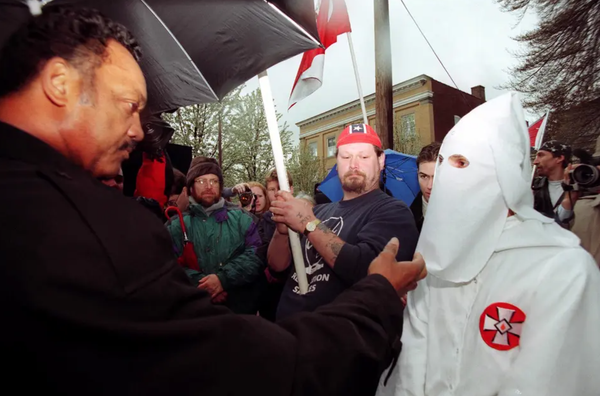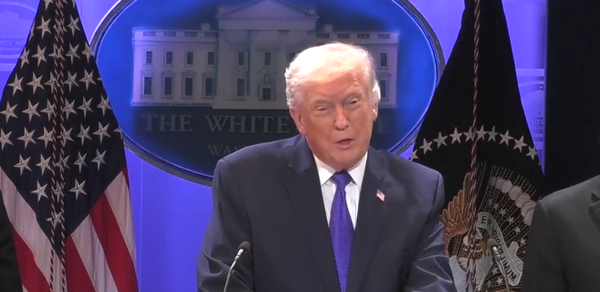The Fascists Among Us
A story about standing for what's right even if it hurts.

The time I traded a measure of pain for a clear conscience involved a dog.
It was a stray dog. It roamed between the creek, the cornfield and the pizzeria I worked in. I was real skinny back then. Soaking wet, I was maybe 120 pounds. The manager that day was not. Barry (not his real name) was burly. Pushing 300, at least. Barry didn’t like dogs. That was fine. The problem was he wanted to torture this one.
Barry was like boys I knew growing up in rural upstate. Wild animals were a part of childhood. Wild animals were often entertainment. By that, I mean some people took pleasure in maiming and killing them. I once saw a boy in our trailer park delight in stomping a frog under his boot heel. He thrilled at seeing my horrified face.
I don’t know if Barry did that, but he was looking for fun during long night hours. The dog had come around. Its hunger was an opportunity. Barry made a big deal of his plan. He’d bait it, then kick it to teach it a lesson—don’t come beggin’ round here.
I don’t remember all the details, but I remember three.
The time I traded a measure of pain for a clear conscience involved a dog.
First was that Barry was intimidating. He was taller than me. He was older than me. He was wilder and angrier than me. He was the kind of adult I knew to whom fear equaled respect. So I feared him, and I showed it. The second detail is feeling this was wrong. It was wrong to kick a hungry animal. It needed food, not punishment. The third detail is deciding I was going to do something even if I suffered for it.
So I squared off with Barry. Jesus God, he was an ugly somebitch. He was dumb, too. That would cost him later. There’s a still image in my mind’s eye of him running to the backdoor engulfed in blue flame. He set himself on fire stripping paint off the pizza oven with turpentine. The big dummy forget to turn off the pilot light. We put him out in the end. When I saw him years afterward, his face looked the cheese pizza I ordered.
It wasn’t much of a change, honestly. He made his ugly uglier by dry shaving. He claimed it toughed up his skin. He made clear to anyone listening this was a good thing. The result, however, was a fantasia of nicks and blood over which hovered his hard black eyes. With hideous red lips, he said: “So what? Are you going to stop me?”
There are volumes of subliminal meaning in those words. Are you, a skinny teenager, going to stop me, a full-grown man more than twice your size? Are you, someone with no power, going to stop me, someone with power? This is what he was saying without saying. This is what he was asking without asking. He wanted me to say kicking a hungry dog was wrong. He wanted me to deny him the authority he said he deserved.
He wanted to punish me for denying him that authority.
Then, after our eyes locked, something changed. I could see it. Perhaps it was the realization what he wanted was going somewhere he didn’t want to go. Barry was about to criminally assault a minor. Was teaching a lesson to a dog—and to me—worth the cost of answering to an authority greater than his own? Apparently not.
Barry is a Trump voter. I don’t know for a fact, but I have no doubt. If he wasn’t dead in 2016, or otherwise incapacitated, he voted for the president. If he bothers to, he’s going to vote for Donald Trump again. This is as true to me as the air I’m breathing.
Barry is an example of something some leftists will not admit. Class does not motivate him. Economic justice means nothing. Morality is irrelevant. Some leftist scholars believe liberalism failed to meet Barry’s economic needs, so they voted for Trump. But that’s not it. For millions of Americans like Barry, that cause and effect is not it at all.
“Economic anxiety” was a convenient rationale for what they already wanted to do, which was doing what that boy did in the trailer part: stomp other beings. The point isn’t just to be cruel. The point is taking pleasure in acting cruelly to those whom they believe deserve such cruelty. They deserve it for the “crime” of being who they are.
He wanted to punish me for denying his authority.
Seymour Martin Lipset understood this in his own way. In 1959, he coined the phrase “working class authoritarianism” to describe “people who formed the base of the Nazi labor unions, the White Citizen’s Councils in the segregated American south, and race rioters in England.” These people are “the most nationalistic and jingoistic sector of the population. In a number of nations, they have clearly been in the forefront of the struggle against equal rights for minority groups, and have sought to limit immigration or to impose racial standards in countries with open immigration.”
As Jordan Michael Smith wrote in the journal Democracy in January of 2016, Lipset’s working-class authoritarianism “describes a Donald Trump rally almost perfectly.”
I have no doubt Barry is in the minority of Americans just as I have no doubt he voted for Trump. A majority believes in democracy. A majority, including many white working-class Americans, believe in minding their own business. But the majority has also become complacent or even indifferent to home-grown fascism. The only way to stop it is for the majority to no longer be indifferent. The majority must make a choice.
It must decide to trade a measure of pain for a clear conscience.
—John Stoehr




